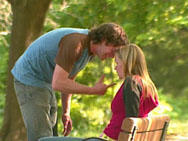 PART 1 of 4
PART 1 of 4  A few weeks ago I was channel surfing and came across ABC’s 20/20 featuring a twist on the “hidden camera” investigation that I found to be as equally as unethical as any other use of hidden cameras.
A few weeks ago I was channel surfing and came across ABC’s 20/20 featuring a twist on the “hidden camera” investigation that I found to be as equally as unethical as any other use of hidden cameras.ABC News hired actors Nate and Sarah to act out a scenario in which a couple gets into a heated, almost violent, argument in public. This report was dressed up as 20/20 series about ethical dilemmas to determine if people do the right thing.
 The irony of this series is in the fact the reporter and producers forgot to consider the ethics of their own behavior in using deception as a tactic in this hidden camera experiment. It was so over the top and clearly unethical from a social science point of view (informed consent of the participants-- they became participants against their will) as well as from the journalism POV.
The irony of this series is in the fact the reporter and producers forgot to consider the ethics of their own behavior in using deception as a tactic in this hidden camera experiment. It was so over the top and clearly unethical from a social science point of view (informed consent of the participants-- they became participants against their will) as well as from the journalism POV.20/20 also attempted to present this story as a social experiment and framed it as an academic exercise to probe society. I suspect most
 Institutional Review Boards (IRBs) at universities would refuse to allow such tactics because hidden cameras are clear violations of informed consent.
Institutional Review Boards (IRBs) at universities would refuse to allow such tactics because hidden cameras are clear violations of informed consent.From my read of most credible social science approaches to research interviewing and participant observation, getting permission from people after the fact violates the spirit of the informed consent on so many levels (continued in next entry).



